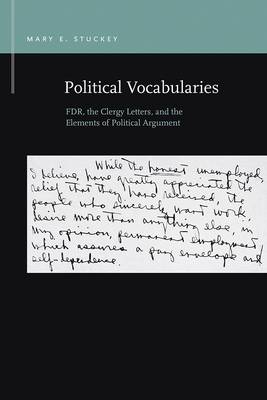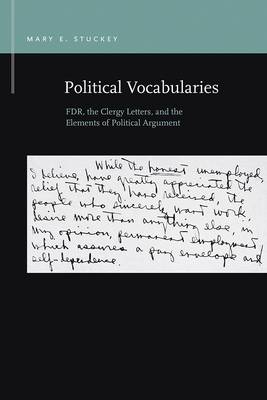
- Afhalen na 1 uur in een winkel met voorraad
- Gratis thuislevering in België vanaf € 30
- Ruim aanbod met 7 miljoen producten
- Afhalen na 1 uur in een winkel met voorraad
- Gratis thuislevering in België vanaf € 30
- Ruim aanbod met 7 miljoen producten
Zoeken
Political Vocabularies
Fdr, the Clergy Letters, and the Elements of Political Argument
Mary E Stuckey
€ 59,95
+ 119 punten
Omschrijving
Political Vocabularies: FDR, the Clergy Letters, and the Elements of Political Argument uses a set of letters sent to Franklin D. Roosevelt in 1935 by American clergymen to make a larger argument about the rhetorical processes of our national politics. At any given moment, national politics are constituted by competing political imaginaries, through which citizens understand and participate in politics. Different imaginaries locate political authority in different places, and so political authority is very much a site of dispute between differing political vocabularies. Opposing political vocabularies are grounded in opposing characterizations of the specific political moment, its central issues, and its citizens, for we cannot imagine a political community without populating it and giving it purpose. These issues and people are hierarchically ordered, which provides the imaginary with a sense of internal cohesion and which also is a central point of disputation between competing vocabularies in a specific epoch. Each vocabulary is grounded in a political tradition, read through our national myths, which authorize the visions of national identity and purpose and which contain significant deliberative aspects, for each vision of the nation impels distinct political imperatives. Such imaginaries are our political priorities in action. Taking one specific moment of political change, the author illuminates the larger processes of change, competition, and stability in national politics.
Specificaties
Betrokkenen
- Auteur(s):
- Uitgeverij:
Inhoud
- Aantal bladzijden:
- 298
- Taal:
- Engels
- Reeks:
Eigenschappen
- Productcode (EAN):
- 9781611862652
- Verschijningsdatum:
- 1/03/2018
- Uitvoering:
- Paperback
- Formaat:
- Trade paperback (VS)
- Afmetingen:
- 152 mm x 226 mm
- Gewicht:
- 476 g

Alleen bij Standaard Boekhandel
+ 119 punten op je klantenkaart van Standaard Boekhandel
Beoordelingen
We publiceren alleen reviews die voldoen aan de voorwaarden voor reviews. Bekijk onze voorwaarden voor reviews.











